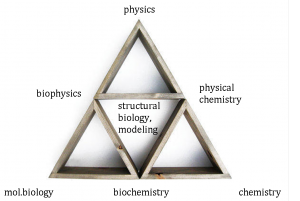 The School will introduce the participants (Ph.D. students) to various vantage points and aspects of the physics, chemistry and structure of biological and soft systems. The participants and lecturers come from comparably diverse scientific communities. Specifically, it will focus on the biomacromolecular complexes and assemblies (protein-RNA/DNA complexes, e.g., viruses, ribosomes; quaternary protein structures; DNA, proteins/ligands and polyelectrolytes). The lecturers will describe related problems and discuss approaches to their solutions, e.g.:
The School will introduce the participants (Ph.D. students) to various vantage points and aspects of the physics, chemistry and structure of biological and soft systems. The participants and lecturers come from comparably diverse scientific communities. Specifically, it will focus on the biomacromolecular complexes and assemblies (protein-RNA/DNA complexes, e.g., viruses, ribosomes; quaternary protein structures; DNA, proteins/ligands and polyelectrolytes). The lecturers will describe related problems and discuss approaches to their solutions, e.g.:
- spectroscopies (NMR, EPR, FTIR, Raman…)
- microscopies (AFM, fluorescence techniques, super resolution…)
- diffraction methods
- computational solutions, modeling and simulations
The School is intended for young scientists (primarily Ph.D. students) at the beginning of their academic careers who are interested in the fundamental study of biomacromolecules: the structures of nucleic acid/protein complexes (ribosomes, viruses, chromatin), protein aggregation, conformational dynamics, folded and intrinsically disordered proteins, enzymatic activity—small molecule recognition, biomacromolecular interactions, bioenergetics and single molecule biophysics.
In addition to the School’s inherent role in the transfer of knowledge and ideas, we emphasize its catalytic role in arranging future research collaborations, joint projects, visits and postdoc positions – and friendships. The previous 11th and 12th Schools were attended by 70-80 Ph.D. students, from 20 countries in Europe and some from Iran, Australia, Armenia and Russia. Usually 2/3 of the students presented the poster, of which about 20 gave also a short talk. There were usually about 20 lecturers from different countries: Austria, Australia, Belgium, Croatia, Germany, Hungary, Italy, France, Spain, Sweden, Switzerland, Slovenia, UK and USA.
The School, future and past
With the legacy of Prof. Pifat-Mrzljak in mind, it is the intention of the organizers to position this school as a biennial event, complementary to, rather than competing with, relevant international activities, e.g., the Regional Biophysics Conference or the EBSA Biophysics Course. In 2014 it was also coorganized by COST CM1306 Molecular Machines action as a training event for this Action.
We remind that for more than 30 years, the school was chaired by the late Prof. Greta Pifat-Mrzljak, an eminent Croatian biophysicist and recipient of the American Biophysical Society’s Emily M. Gray Award, and is generally regarded as one of the best of its kind in Europe. Through the years, it has been attended by more than one thousand Ph.D. students and postdocs interested in becoming acquainted with the state-of-the-art in biophysics. The lecturers have always been of the highest quality, including top scientists in their respective disciplines and several Nobel laureates.
